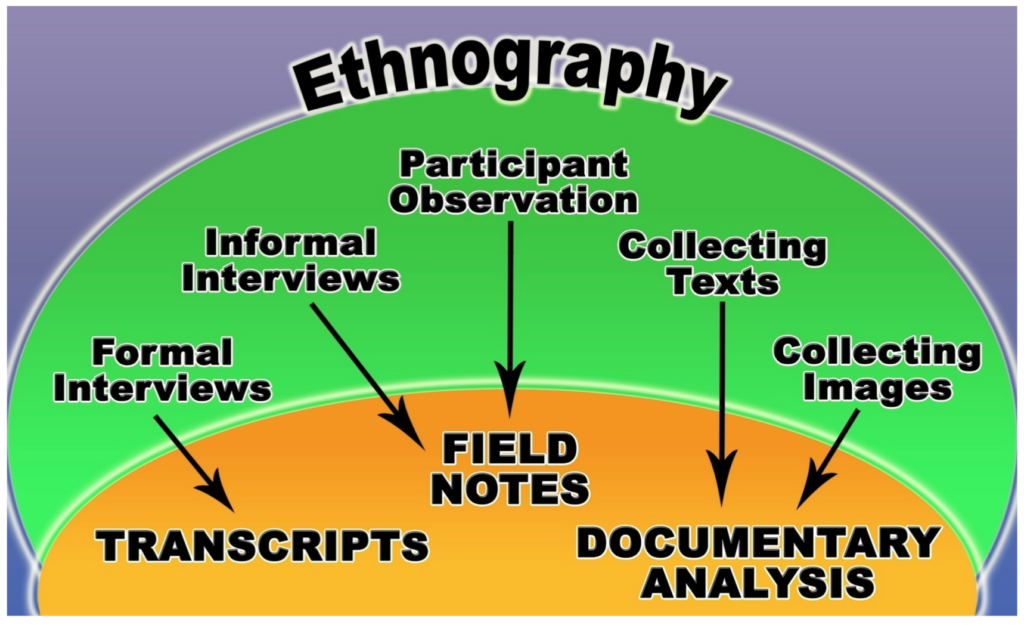Anthropology distinguishes itself from other scientific and humanistic disciplines by using a qualitative research approach that was coined within the field: ethnography. Broadly defined as: “the in-depth study of everyday practices and lives of a people” (Nelson, 2019), ethnography is an important tool for gathering anthropological data (and, more generally, the study of peoples behaviors and culture).
A few questions to guide our thinking process: What makes ethnography different from other research approaches? How can we use ethnography to study culture, practices, and social interactions? What distinguishes anthropology from other fields in the social sciences?
In this section, you may find resources related to Ethnography, techniques and approaches that can help you while doing fieldwork or proposing an ethnographic project, along with tools that can facilitate this process. I have listed books, toolkits, and other open access resources.
 Research tools within Ethnography
Research tools within Ethnography
Image by James Rhodes, Assistant Professor of Sociology, Hiram College
A- Books*
1- Emerson, Robert M., Fretz, Rachel I., and Shaw, Linda L. (2011). Writing ethnographic fieldnotes. Chicago: The University of Chicago Press.
2- Chrzan, Janet & Brett, John A. (2017). Research methods for anthropological studies of food and nutrition. New York: Berghan Books.
3- Bernard, H. Russell & Gravlee, Clarence C., (Eds). (2015). Handbook of methods in cultural anthropology. London: Rowman & Littlefield.
4- Smith, Linda Tuhiwai. (1999). Decolonizing methodologies: research and indigenous peoples. London: Zed Books.
*this is a sample of books on Ethnographic field methods and data collection techniques/analysis.
B- Websites with Resources for Ethnography and Anthropological Research Methods**
1- The Public Space Research Group, CUNY Graduate Center -The objective of the Public Space Research Group is to create a center for ethnographic research, theory, and policy that focuses on the relationship of public space to people and communities within the context of legal, political and economic forces. You can find information about members, projects, and resources for conducting ethnographic research, focusing on public space.
2- The Toolkit for the Ethnographic Study of Space (TEES) -Created by The Public Space Research Group, CUNY Graduate Center, “The Toolkit for the Ethnographic Study of Space (TESS) is an in-depth method for studying the everyday life of a particular public space. It is a qualitative method that helps you understand the meaning and context of what you learn.” This resource provides an accessible, hands-on kit to conduct ethnographic research, including guide interview questions, templates to document ethnographic data, and strategies to conduct archival research.
3- Research Methods, American Anthropological Association (AAA) – website of the American Anthropological Association (AAA) which includes an array of resources for conducting ethnographic research, including: research design, data collection methods, ethnography, interviewing, data analysis resources, and ethics. The website also has resource guides for data analysis software, and approaches for the four-fields of the discipline.
4- The Institute for Community Research – research institute (non-profit organization) founded in 1987 by Dr. Jean J. Schensul, with the mission of “…creating an organization that stresses collaborative research to transform lives, build alliances, and address root causes of health and educational disparities in the U.S. and globally.” Focusing on Health Disparities, Public Health research, and Participatory action research (PAR).
5- Community Based Participatory Research (CBPR) – Wikipedia entry page that describes this research approach, along with including resources, books, and articles for reference.
**this is a sample of electronic resources, research guides, initiatives and websites available on Ethnographic field methods.



